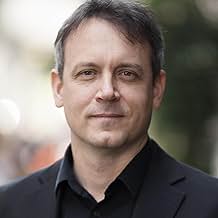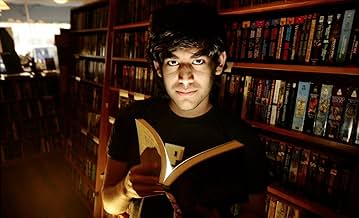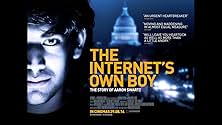O Menino da Internet: A História de Aaron Swartz
Título original: The Internet's Own Boy: The Story of Aaron Swartz
AVALIAÇÃO DA IMDb
8,0/10
18 mil
SUA AVALIAÇÃO
Adicionar um enredo no seu idiomaThe story of programming prodigy and information activist Aaron Swartz, who took his own life at the age of 26.The story of programming prodigy and information activist Aaron Swartz, who took his own life at the age of 26.The story of programming prodigy and information activist Aaron Swartz, who took his own life at the age of 26.
- Direção
- Roteirista
- Artistas
- Prêmios
- 4 vitórias e 4 indicações no total
Aaron Swartz
- Self
- (cenas de arquivo)
Stephen Heymann
- Self - Asst. U.S. Attorney Massachusetts
- (cenas de arquivo)
Avaliações em destaque
9xWRL
This warm yet chilling documentary retraces the life of Aaron Swartz, who committed suicide at age 26 after a couple of years of severe and deepening pressure from the criminal justice system, which was trying him for a number of felonies resulting from his breaking into MIT's computers.
We first see him as a young kid in home movies, then as a prodigy who while very young was brimming with new ideas for the Internet and applied genius-level programming skills to co-developing RSS and Reddit. Bored with college and with working for the business establishment, he turned to activism, promoting an open Web culture for the benefit of all users.
Swartz's activism turned into hacktivism, landing him in deep trouble with the Justice Department, which charged him with crimes that could have sent him to prison for 35 years. Touching, pointed accounts from family members and close associates describe what Aaron was like and how he responded to unyielding Justice Department efforts to use him as an example.
The interviews with law professor Lawrence Lessig and World Wide Web inventor Tim Berners-Lee are unforgettably moving. The film does a good job of calling into question Swartz's harsh treatment by the same Justice Department that shied away from prosecuting the big money interests that brought down our financial system.
Whether you sympathize with Swartz or not, the film does a solid job of showing how blind justice in the U.S. can be when it wants to be.
We first see him as a young kid in home movies, then as a prodigy who while very young was brimming with new ideas for the Internet and applied genius-level programming skills to co-developing RSS and Reddit. Bored with college and with working for the business establishment, he turned to activism, promoting an open Web culture for the benefit of all users.
Swartz's activism turned into hacktivism, landing him in deep trouble with the Justice Department, which charged him with crimes that could have sent him to prison for 35 years. Touching, pointed accounts from family members and close associates describe what Aaron was like and how he responded to unyielding Justice Department efforts to use him as an example.
The interviews with law professor Lawrence Lessig and World Wide Web inventor Tim Berners-Lee are unforgettably moving. The film does a good job of calling into question Swartz's harsh treatment by the same Justice Department that shied away from prosecuting the big money interests that brought down our financial system.
Whether you sympathize with Swartz or not, the film does a solid job of showing how blind justice in the U.S. can be when it wants to be.
In a world where idealism is a scarce commodity, Aaron Swartz stood out. A computer programmer and political and social activist, Aaron had a quaint goal — to make the world a better place, to help us live our lives so that they make a difference. Ultimately, however, though he tried to save the world, he could not save himself. On January 11, 2013, Swartz, age 26, hanged himself in his New York apartment, after having been vigorously pursued by the U.S. Department of Justice for two years for hacking MIT's computer network and downloading 4.8 million documents from the JSTOR database, a private corporation that charged exorbitant fees for non-subscribers to view online research.
Swartz's story is told in a deeply moving and very disturbing documentary The Internet's Own Boy: The Story of Aaron Swartz, directed by Brian Knappenberger. The film traces Swartz' life from the time he was a three-year-old prodigy able to read a meeting notice posted on the refrigerator to his later years when he created the prototype for Wikipedia, helped start up RSS and Reddit and wrote specifications for Creative Commons, an organization devoted to enabling the free distribution of an otherwise copyrighted work. Wherever he was, however, he challenged the system and the corporate organizational structure whether it was in high school, Stanford University, or Silicon Valley.
Though the film does not break new ground stylistically, the interviews with Aaron's family, girlfriends, and friends such as Net activists Tim Berners-Lee who created the World Wide Web and author Cory Doctorow are illuminating and often inspiring. Some of the best scenes are Swartz's political campaign to defeat SOPA, the Stop Online Piracy Act introduced in Congress and expected to pass. He galvanized the opposition with creative use of the Internet to ultimately defeat a bill he thought would restrict Internet freedom. He also worked for now Senator Elizabeth Warren, one of the few progressive voices in our politics.
Swartz defended his action in hacking MIT's computers in a manifesto that read in part, "Information is power. But like all power, there are those who want to keep it for themselves. The world's entire scientific and cultural heritage, published over centuries in books and journals, is increasingly being digitized and locked up by a handful of private corporations. Want to read the papers featuring the most famous results of the sciences? You'll need to send enormous amounts to publishers like Reed Elsevier." In the tradition of Thoreau, he said, "There is no justice in following unjust laws. It's time to come into the light and, in the grand tradition of civil disobedience, declare our opposition to this private theft of public culture." While Aaron's decision to free scholarly works from MIT from private corporate control may have been ill-advised, the government's treatment of him as a dangerous criminal was unwarranted and out of proportion to the crime. Originally indicted on four counts, after his SOPA campaign was successful, Carmen Ortiz, U.S. Attorney for the district of Massachusetts, upped the number of counts to thirteen to "send a message." She accused Swartz of violating Title 18 of the U.S. Code, which carries a maximum penalty of 50 years in jail and one million dollars in fines.
Ortiz who pursued the case even after JSTOR agreed to drop the charges, justified the indictment by saying, "stealing is stealing whether you use a computer command or a crowbar, and whether you take documents, data, or dollars." Attorney General Eric Holder defended Ortiz's prosecution before the Senate Judiciary Committee, terming it, "a good use of prosecutorial discretion." After Swartz' death, Ortiz issued a statement saying that her office had never intended to seek maximum penalties against him, a small consolation to Swartz' family.
In contrast, the U.S. Department of Justice never intended to seek ANY penalties against those responsible for the financial manipulations and fraud that wiped out the jobs and living standards of millions of people. The Internet's Own Boy: The Story of Aaron Swartz is not just an advocacy film, but a character study of a young man who was not afraid to challenge what he thought was an unjust system. A clip is shown of Swartz saying, "I think you should always be questioning, I take this very scientific attitude in which everything you've learned is just provisional, that it's always open to recantation, refutation I think the same thing applies to society." As a fitting epitaph to Aaron's life, author Justin Peters, recalled an event held one week after his death. A large banner was spread out on a table where people recorded memories of Aaron and messages of condolence. According to Peters, "near the end of the night, a slender boy in a plain sweatshirt who looked too young to be there came over to the table. He uncapped a marker. He wrote simply, 'We will continue.'"
Swartz's story is told in a deeply moving and very disturbing documentary The Internet's Own Boy: The Story of Aaron Swartz, directed by Brian Knappenberger. The film traces Swartz' life from the time he was a three-year-old prodigy able to read a meeting notice posted on the refrigerator to his later years when he created the prototype for Wikipedia, helped start up RSS and Reddit and wrote specifications for Creative Commons, an organization devoted to enabling the free distribution of an otherwise copyrighted work. Wherever he was, however, he challenged the system and the corporate organizational structure whether it was in high school, Stanford University, or Silicon Valley.
Though the film does not break new ground stylistically, the interviews with Aaron's family, girlfriends, and friends such as Net activists Tim Berners-Lee who created the World Wide Web and author Cory Doctorow are illuminating and often inspiring. Some of the best scenes are Swartz's political campaign to defeat SOPA, the Stop Online Piracy Act introduced in Congress and expected to pass. He galvanized the opposition with creative use of the Internet to ultimately defeat a bill he thought would restrict Internet freedom. He also worked for now Senator Elizabeth Warren, one of the few progressive voices in our politics.
Swartz defended his action in hacking MIT's computers in a manifesto that read in part, "Information is power. But like all power, there are those who want to keep it for themselves. The world's entire scientific and cultural heritage, published over centuries in books and journals, is increasingly being digitized and locked up by a handful of private corporations. Want to read the papers featuring the most famous results of the sciences? You'll need to send enormous amounts to publishers like Reed Elsevier." In the tradition of Thoreau, he said, "There is no justice in following unjust laws. It's time to come into the light and, in the grand tradition of civil disobedience, declare our opposition to this private theft of public culture." While Aaron's decision to free scholarly works from MIT from private corporate control may have been ill-advised, the government's treatment of him as a dangerous criminal was unwarranted and out of proportion to the crime. Originally indicted on four counts, after his SOPA campaign was successful, Carmen Ortiz, U.S. Attorney for the district of Massachusetts, upped the number of counts to thirteen to "send a message." She accused Swartz of violating Title 18 of the U.S. Code, which carries a maximum penalty of 50 years in jail and one million dollars in fines.
Ortiz who pursued the case even after JSTOR agreed to drop the charges, justified the indictment by saying, "stealing is stealing whether you use a computer command or a crowbar, and whether you take documents, data, or dollars." Attorney General Eric Holder defended Ortiz's prosecution before the Senate Judiciary Committee, terming it, "a good use of prosecutorial discretion." After Swartz' death, Ortiz issued a statement saying that her office had never intended to seek maximum penalties against him, a small consolation to Swartz' family.
In contrast, the U.S. Department of Justice never intended to seek ANY penalties against those responsible for the financial manipulations and fraud that wiped out the jobs and living standards of millions of people. The Internet's Own Boy: The Story of Aaron Swartz is not just an advocacy film, but a character study of a young man who was not afraid to challenge what he thought was an unjust system. A clip is shown of Swartz saying, "I think you should always be questioning, I take this very scientific attitude in which everything you've learned is just provisional, that it's always open to recantation, refutation I think the same thing applies to society." As a fitting epitaph to Aaron's life, author Justin Peters, recalled an event held one week after his death. A large banner was spread out on a table where people recorded memories of Aaron and messages of condolence. According to Peters, "near the end of the night, a slender boy in a plain sweatshirt who looked too young to be there came over to the table. He uncapped a marker. He wrote simply, 'We will continue.'"
Orin Kerr, professor and former federal prosecutor, describes the motivation of the government's case as their fear that, as stated in his "Open Access Manifesto", Aaron believed it was a moral imperative to be committed to breaking the law to overcome a law that was unjust, and that, if allowed to succeed in "nullifying" the law, that everyone would have access to the data base and therefore "the toothpaste would be out of the tube" and somehow chaos would ensue, or as he phrases it, "Swartz's side would win". Apparently, free access to scholarly and scientific journals must be restricted to protect the people from themselves.
There is also the issue of civil disobedience in general and the ways those in power portray such actions and those who encourage them. As one other reviewer here states, "when you commit an act of criminal civic disobedience, you should do so accepting that you will most likely pay the price for that action". That is true, however, as Gilbert and Sullivan suggested, the punishment should fit the crime, especially when, as in this case, the "crime" is questionable at best. I wonder how the current US administration would view the acts of Gandhi or Mandela were they occurring now and posing a threat to their political status quo and not seen safely through the rear view mirror of history. It wasn't that long ago that many in power in America considered Mandela , in particular, a "terrorist".
This excellent documentary is a cautionary tale that all free thinking and well meaning people must see and understand. Secrecy is power and governments will do whatever they can to protect it. As Aaron himself suggested, this is a battle that will never be won, but can never be abandoned.
See this film.
There is also the issue of civil disobedience in general and the ways those in power portray such actions and those who encourage them. As one other reviewer here states, "when you commit an act of criminal civic disobedience, you should do so accepting that you will most likely pay the price for that action". That is true, however, as Gilbert and Sullivan suggested, the punishment should fit the crime, especially when, as in this case, the "crime" is questionable at best. I wonder how the current US administration would view the acts of Gandhi or Mandela were they occurring now and posing a threat to their political status quo and not seen safely through the rear view mirror of history. It wasn't that long ago that many in power in America considered Mandela , in particular, a "terrorist".
This excellent documentary is a cautionary tale that all free thinking and well meaning people must see and understand. Secrecy is power and governments will do whatever they can to protect it. As Aaron himself suggested, this is a battle that will never be won, but can never be abandoned.
See this film.
I don't know why the Aaron Swartz story was never on my radar, which is one of the reasons why The Internet's Own Boy was an eye-opener. His is a tragic story, and although the filmmakers secured screen time with (almost) all involved, it's sad that all we have from Swartz is archival webcam interview footage. The movie makes a persuasive case for his being made a high-profile example by the justice system, and there's enough here to leave you either irate or fearful (or both).
Whether or not you agree with the man's politics, he made a difference - hell, he was instrumental in getting SOPA struck down, so he deserves our respect for that - and his story brings to light the need for fine-tuning the ancient copyright laws. Either way, this documentary delivers.
7/10
Whether or not you agree with the man's politics, he made a difference - hell, he was instrumental in getting SOPA struck down, so he deserves our respect for that - and his story brings to light the need for fine-tuning the ancient copyright laws. Either way, this documentary delivers.
7/10
The story of Aaron Swartz, who killed himself at the age of 26, is sad but inevitable consequence of the world we inhabit.
From his earliest days, he was a prodigy, not only developing the skills of reading and processing information at an early age, but acquiring a unique ability to write programs and offer innovative solutions to many problems presented in the early years of the Internet. With the help of testimonies from Swartz's family, plus colleagues and friends including the inventor of the web, Tim Berners-Lee, Brian Knappenberger's film traces the meteoric career of a genius who appeared to be able to offer solutions that no one else could. More significantly, Swartz had the ability to communicate with his interlocutors, not just in small-group situations but in public arenas as well. This is what rendered him such a powerful figure; although physically diminutive, he had a gift for speech-making that proved hypnotic in its effect.
Matters came to a head, however, when Swartz hacked the JSTOR sits, an address used mostly for publishing scholarly journals across all disciplines, downloaded the information and made it available to all web users. This completely contravened JSTOR's principle, which was to make that information only available to subscribers, mostly in academic institutions. The principle might have been a noble one (why shouldn't all users have equal access to information, especially if it aids their research?), but the American government's response was predictably harsh, as they charged Swartz with a variety of crimes under an Act issued as long ago as the mid- Eighties.
Knappenberger's film suggests with some justification that this reaction was ludicrously out of proportion to the nature of Swartz's so-called 'crimes.' He had neither challenged the Constitution nor caused harm to others; on the contrary he had simply worked in the interests of democratization. He was the victim of the same kind of paranoia that underpinned the anti-communist campaigns six decades ago, when legions of innocent people were rounded up and made to 'confess' their alleged involvement with a plot to subvert the American way of life, even if they had not done anything. The same applied to Swartz, who was offered the promise of lenient legal treatment in exchange for a 'confession.'
The familiarity of Swartz's plight suggests that a climate of intolerance still exists in a country that consistently advertises its democratic credentials, especially when compared with other territories in the world. THE INTERNET'S OWN BOY suggests otherwise; if the government was truly democratic, it would either have understood Swartz's motives, or meted out the same harsh treatment to other criminals - such as those who precipitated the Wall Street crisis of 2008. But who said anything was truly equal in American society?
THE INTERNET'S OWN BOT is a polemical piece that leaves viewers feeling both angry and frustrated - angry that a talented soul like Swartz should have had his life cut brutally short, and frustrated that the government should have pursued such heavy-handed treatment. If the film can inspire more activism to try and change official policies, it will have achieved much.
From his earliest days, he was a prodigy, not only developing the skills of reading and processing information at an early age, but acquiring a unique ability to write programs and offer innovative solutions to many problems presented in the early years of the Internet. With the help of testimonies from Swartz's family, plus colleagues and friends including the inventor of the web, Tim Berners-Lee, Brian Knappenberger's film traces the meteoric career of a genius who appeared to be able to offer solutions that no one else could. More significantly, Swartz had the ability to communicate with his interlocutors, not just in small-group situations but in public arenas as well. This is what rendered him such a powerful figure; although physically diminutive, he had a gift for speech-making that proved hypnotic in its effect.
Matters came to a head, however, when Swartz hacked the JSTOR sits, an address used mostly for publishing scholarly journals across all disciplines, downloaded the information and made it available to all web users. This completely contravened JSTOR's principle, which was to make that information only available to subscribers, mostly in academic institutions. The principle might have been a noble one (why shouldn't all users have equal access to information, especially if it aids their research?), but the American government's response was predictably harsh, as they charged Swartz with a variety of crimes under an Act issued as long ago as the mid- Eighties.
Knappenberger's film suggests with some justification that this reaction was ludicrously out of proportion to the nature of Swartz's so-called 'crimes.' He had neither challenged the Constitution nor caused harm to others; on the contrary he had simply worked in the interests of democratization. He was the victim of the same kind of paranoia that underpinned the anti-communist campaigns six decades ago, when legions of innocent people were rounded up and made to 'confess' their alleged involvement with a plot to subvert the American way of life, even if they had not done anything. The same applied to Swartz, who was offered the promise of lenient legal treatment in exchange for a 'confession.'
The familiarity of Swartz's plight suggests that a climate of intolerance still exists in a country that consistently advertises its democratic credentials, especially when compared with other territories in the world. THE INTERNET'S OWN BOY suggests otherwise; if the government was truly democratic, it would either have understood Swartz's motives, or meted out the same harsh treatment to other criminals - such as those who precipitated the Wall Street crisis of 2008. But who said anything was truly equal in American society?
THE INTERNET'S OWN BOT is a polemical piece that leaves viewers feeling both angry and frustrated - angry that a talented soul like Swartz should have had his life cut brutally short, and frustrated that the government should have pursued such heavy-handed treatment. If the film can inspire more activism to try and change official policies, it will have achieved much.
Você sabia?
- Citações
First Title Cards: Unjust Laws exist; shall we be content to obey them, or shall we edeavor to amend them, and obey them until we have suceeded, or shall we transgress them at once?- Henry David Thoreau
- ConexõesFeatures O Mágico de Oz (1939)
- Trilhas sonorasExtraordinary Machine
Written and Performed by Fiona Apple
Principais escolhas
Faça login para avaliar e ver a lista de recomendações personalizadas
- How long is The Internet's Own Boy: The Story of Aaron Swartz?Fornecido pela Alexa
Detalhes
- Data de lançamento
- País de origem
- Central de atendimento oficial
- Idioma
- Também conhecido como
- The Internet's Own Boy: The Story of Aaron Swartz
- Empresas de produção
- Consulte mais créditos da empresa na IMDbPro
Bilheteria
- Faturamento bruto nos EUA e Canadá
- US$ 48.911
- Fim de semana de estreia nos EUA e Canadá
- US$ 21.705
- 29 de jun. de 2014
- Faturamento bruto mundial
- US$ 48.911
- Tempo de duração
- 1 h 45 min(105 min)
- Cor
- Proporção
- 1.78 : 1
Contribua para esta página
Sugerir uma alteração ou adicionar conteúdo ausente














